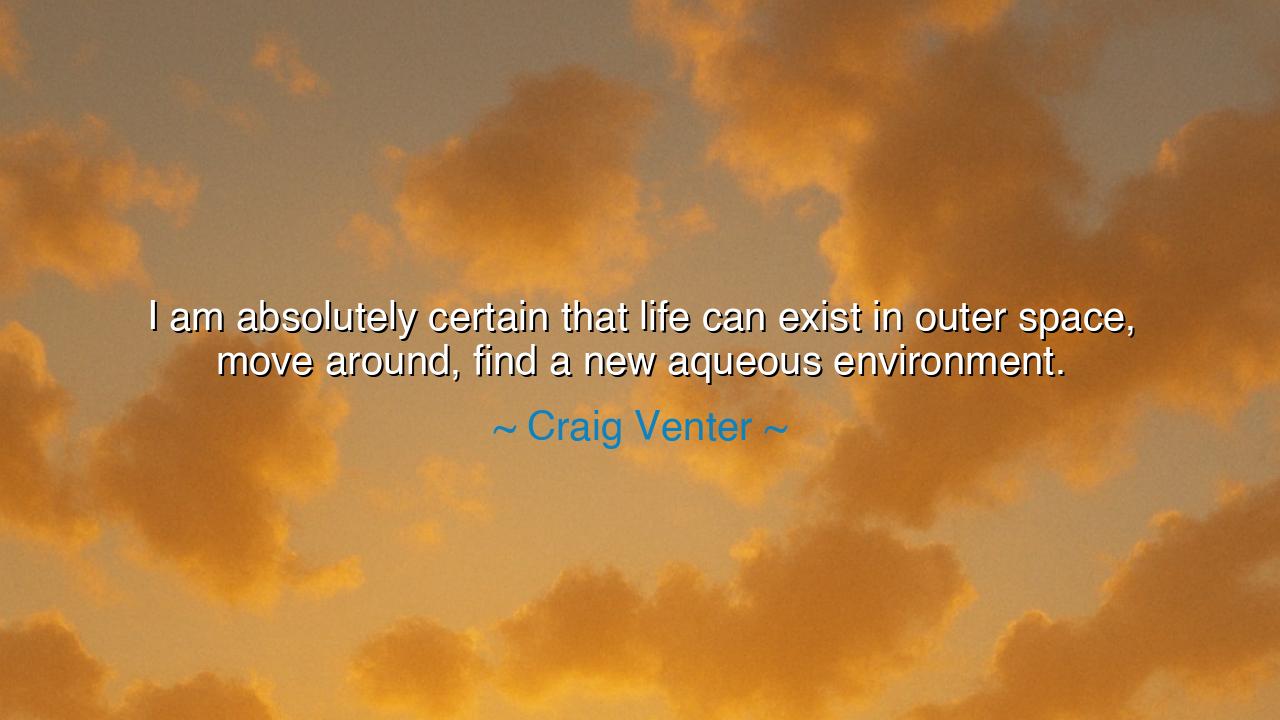
I am absolutely certain that life can exist in outer space, move
I am absolutely certain that life can exist in outer space, move around, find a new aqueous environment.






"I am absolutely certain that life can exist in outer space, move around, find a new aqueous environment." These words, spoken by the bold and visionary Craig Venter, reflect a conviction that has stirred the hearts and minds of explorers for centuries. The very notion that life—in whatever form it may take—can not only exist beyond the Earth but can also adapt to the infinite diversity of environments in space is both a profound challenge to our understanding and a call to expand the limits of human possibility. Venter’s confidence reflects a timeless belief that human curiosity, coupled with our determination, can lead us to answers about the very nature of life itself—whether on Earth, in the farthest reaches of the cosmos, or in places we have not yet imagined.
In the distant past, the great ancient civilizations looked to the stars and wondered about the possibility of life beyond their world. The Greeks, for example, who were the first to give voice to a structured understanding of the heavens, postulated that the universe might be filled with stars and worlds far beyond their own. Aristotle, while grounding his teachings in the natural world, could not help but look to the sky and imagine what might exist beyond the Earth’s boundaries. Yet, despite their wisdom, these early thinkers could not conceive of life extending beyond the earthly realm in the way we now think of it. They looked up with awe, but they could not yet fathom that one day, humanity itself would reach out into the vast expanse of space, and with science and technology, come to understand the potential of life in the cosmos.
In this same spirit, Craig Venter’s assertion that life can not only exist in outer space but also find its way to new aqueous environments is a vision that continues the ancient journey of exploration. The desire to reach beyond the confines of Earth has been a central theme throughout human history. The Age of Discovery, led by figures like Christopher Columbus and Marco Polo, showed that humans were capable of traversing vast, unknown spaces, finding new lands, and making sense of unfamiliar territories. Similarly, space exploration represents the next great frontier of discovery, where, as Venter suggests, life may not only survive but thrive in environments that we once thought inhospitable.
Consider the example of NASA’s Voyager missions—the spacecraft that have traveled further than any human-made objects in history. Launched in the 1970s, these probes have ventured beyond the solar system, gathering data that has expanded our understanding of space. Their journey is not just one of technology, but of the very essence of discovery—a relentless pursuit to understand the vastness of the universe. Just as Columbus and other explorers charted unknown lands, the Voyager probes, though devoid of human passengers, are the emissaries of humanity, sending back data that suggests that even in the most extreme environments, the building blocks for life may exist. In this way, they mirror Venter’s belief that life is adaptive—capable of surviving in alien environments, seeking out new homes where the conditions may be radically different from what we know.
The lesson of Venter’s words is this: life is resilient, it is adaptive, and it is capable of finding a way to flourish in places that may seem utterly foreign to us. Just as life on Earth has evolved and adapted to the most extreme conditions—whether it be the freezing cold of the poles or the scorching heat of the desert—so too can life in space adapt to the conditions of other planets, moons, or celestial bodies. This speaks not only to the potential of science but to the resilience of the human spirit. As we look to the stars, we are reminded that our greatest strength lies not in our physical bodies alone, but in our capacity to adapt, to innovate, and to survive in the most difficult and uncertain of circumstances.
In your own life, remember that, like life in space, you too possess the ability to adapt and thrive, even in the most challenging environments. Life is filled with unpredictable shifts, uncertain waters, and at times, overwhelming odds. Yet, in every challenge, there is potential for growth, for discovery, and for reinvention. Whether you are facing adversity in your career, relationships, or health, the key is to adapt—to find ways to thrive no matter how difficult the circumstances may seem. The universe itself teaches us this lesson: nothing is permanent, and change is inevitable. But in that change, there is opportunity for growth and new possibilities.
Let us take this wisdom into our own hearts: just as humanity has risen to meet the challenge of exploring the stars, so too can we rise to meet the challenges in our own lives. With innovation, resilience, and the belief that life—in all its forms—has the potential to flourish even in the harshest of environments, we can carve out paths toward success, fulfillment, and discovery. Just as Venter believes that life can find a way to survive and adapt in space, so can you find a way to thrive in your journey, no matter how distant the horizon may seem. Let your spirit, like the life he speaks of, remain strong and unshaken as you seek your way in the ever-expanding universe of opportunity.






AAdministratorAdministrator
Welcome, honored guests. Please leave a comment, we will respond soon